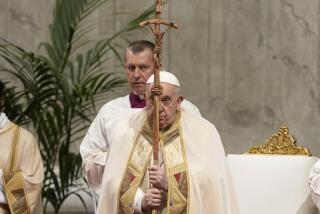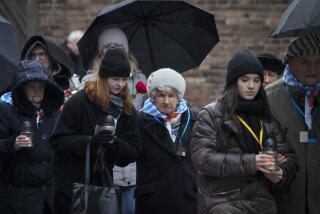Hollow Apology by the Vatican
- Share via
Promised more than a decade ago by Pope John Paul II, the Vatican’s repentance for its official silence and what many consider its unofficial complicity in the Holocaust boils down to a version of “mistakes were made.”
The long-awaited statement was a well-intentioned attempt to, as the pope put it, “help heal the wounds of past misunderstandings and injustices.” But the statement instead strongly defends the actions of Pope Pius XII while blaming the passivity of ordinary Catholics who watched as Hitler’s soldiers killed 6 million Jews, mainly in death camps across Europe.
The 12-page document is part of a broader effort by Pope John Paul II, who lived in Nazi-occupied Poland as a young man, to lead the church through “an examination of conscience” as the millennium approaches. Indeed, the report’s title, “We Remember: A Reflection on the Shoah,” uses the Hebrew word for the Holocaust as a gesture of repentance. But what’s inside the cover is sadly inadequate.
Pius reigned from 1939, the first year of the war, until his death in 1958. Where critics of the Vatican have long condemned that pope’s tepid pronouncements against Nazi doctrine, the report praised the “wisdom of Pius’ quiet diplomacy.” Where Catholic bishops in France, Poland and Germany have apologized for their predecessors’ silence and delay in acting to save Jews, the Vatican draws a distinction without a difference between the anti-Judaism of Christians over the centuries and the anti-Semitism of the present century, especially as it was pursued by Hitler and his thugs.
Curiously, the Vatican’s strongest condemnation is reserved for those unnamed and uncounted “Christians . . . [who] were horrified at the disappearance of their Jewish neighbors and yet were not strong enough to raise their voices in protest. . . . We deeply regret the errors and failures of those sons and daughters of the church.”
The future for Jew and Christian alike “demands that we remember,” the Vatican wrote, “for there is no future without memory.” But the Vatican continues to refuse to open its archives on this dark period, and as long as it does that there can be no true memory.
More to Read
Sign up for Essential California
The most important California stories and recommendations in your inbox every morning.
You may occasionally receive promotional content from the Los Angeles Times.













